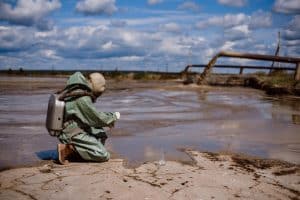Global water scarcity becomes central economic issue

Global water scarcity becomes a central economic issue as it impacts agriculture, industry, and public health, necessitating innovative solutions like smart irrigation and water recycling for sustainable management.
Global water scarcity becomes central economic issue as more regions grapple with diminishing resources.
Have you ever wondered how this affects the economy and your daily life? Let’s dive into the implications.
Understanding global water scarcity
Understanding global water scarcity is crucial as it affects everyone on the planet.
With increasing populations and climate change, many areas are facing severe shortages of fresh water.
This issue is not just about having enough water; it’s also about how we use and manage this vital resource.
What Causes Water Scarcity?
Water scarcity arises from a combination of factors. Some of the primary causes include:
- Population growth leading to higher demand
- Pollution of water sources reducing availability
- Climate change affecting rainfall patterns
- Poor water management and infrastructure
Each of these factors plays a role in diminishing the amount of accessible clean water. As populations grow, the strain on local water supplies increases. Additionally, contaminated sources mean less usable water, which exacerbates the situation.
The Impact of Water Scarcity
When regions face water scarcity, the effects can be severe. It can lead to economic downturns, food shortages, and health crises.
For example, agriculture, which relies heavily on water, struggles when supplies diminish. This creates a ripple effect that can impact food prices and availability.
Communities might also suffer from increased tensions and conflicts over scarce water supplies.
It’s essential to recognize that water scarcity is more than an environmental issue—it’s a strong economic and social challenge.
Solutions to Combat Water Scarcity
There are practical solutions to address global water scarcity. Strategies include:
- Implementing water conservation practices
- Investing in water-efficient technologies
- Enhancing rainwater harvesting
- Improving wastewater treatment and reuse
By adopting these methods, communities can better manage their water resources and mitigate the impact of scarcity.
Ultimately, understanding global water scarcity is the first step toward meaningful action.
By educating ourselves and advocating for better practices, we can help ensure a sustainable water future for everyone.
Economic impacts of water shortages

The economic impacts of water shortages can be profound and far-reaching. When water is scarce, it affects various sectors, from agriculture to industry.
Understanding these impacts is crucial for developing effective response strategies.
Agricultural Challenges
Agriculture is heavily reliant on water, and shortages can lead to reduced crop yields. This situation creates challenges such as:
- Increased food prices due to lower supply
- Loss of jobs in farming and related sectors
- Increased dependence on food imports
Farmers may struggle to sustain their operations when water is not available. This not only impacts their livelihood but also affects local economies.
Industrial Consequences
Industries that depend on water for production will face significant challenges in water-scarce areas. For these businesses, water shortages can result in:
- Higher operational costs as they seek alternative sources
- Reduced productivity and output
- Potential job losses if companies downsize
These outcomes can create a cycle of economic decline, as job losses lead to reduced consumer spending and lower overall economic health.
Additionally, the availability of clean water is vital for maintaining public health. When water sources are contaminated or unavailable, health care costs can rise significantly.
Communities may face outbreaks of waterborne diseases, which can further burden the healthcare system and lead to economic strain.
In summary, the economic impacts of water shortages extend beyond the immediate effects on agriculture and industry.
As water becomes scarcer, entire communities and economies can feel the strain. Recognizing these realities can prompt action toward better water management and conservation strategies.
Strategies for sustainable water use
Implementing strategies for sustainable water use is vital in combating water scarcity.
These strategies can help ensure that communities have enough water now and in the future.
Water Conservation Techniques
Water conservation practices are crucial. Simple changes in daily habits can significantly reduce water consumption. Some effective techniques include:
- Fixing leaks in taps and pipes
- Using water-efficient appliances
- Collecting rainwater for non-potable uses
- Promoting xeriscaping, or landscaping that requires less water
By adopting these practices, individuals and households can lower their water usage, making a positive impact on the environment.
Improving Water Management
Efficient water management is essential for sustainable use. This involves better allocation of water resources and investing in infrastructure.
For instance, updating outdated systems can minimize waste and enhance water delivery. Educating the community about responsible water usage is also key.
Collaboration between authorities, local communities, and businesses can improve overall efficiency.
This teamwork can lead to innovative solutions that cater to specific regional needs.
Utilizing Technology
Technology plays a significant role in enhancing water sustainability. Advanced irrigation systems, such as drip irrigation, can ensure that crops receive the right amount of water, reducing waste.
Additionally, using smart meters helps track water usage, allowing users to identify areas where they can conserve more.
These technological advancements can lead to a significant reduction in water consumption.
Engaging in public awareness campaigns can further promote the importance of sustainable water use. These campaigns can inspire individuals to take action and foster a community-wide commitment to conserving water resources.
Innovative solutions to conserve water
Finding innovative solutions to conserve water is essential in addressing the global water crisis. Many new technologies and practices are emerging to help communities use water more efficiently.
Smart Irrigation Systems
Smart irrigation systems use technology to optimize water usage in agriculture. These systems can monitor soil moisture levels, weather forecasts, and crop needs.
By adjusting the water supply based on real-time data, farmers can significantly reduce water waste.
Some key features of smart irrigation include:
- Automated watering schedules
- Drip irrigation techniques that deliver water directly to plant roots
- Use of sensors to gauge moisture levels
This not only saves water but also promotes healthier crops and higher yields.
Water Recycling and Reuse
Another effective method for conserving water involves recycling and reusing wastewater. This practice involves treating wastewater so that it can be used for non-potable purposes.
Examples of reuse include:
- Using greywater for landscape irrigation
- Recycling water in industrial processes
- Employing treated wastewater for toilet flushing
These initiatives not only conserve fresh water but also reduce the strain on sewage systems.
Furthermore, rainwater harvesting has become a popular technique in many regions. Individuals and communities are investing in systems to capture and store rainwater.
This collected water can be used for irrigation, flushing toilets, and even household cleaning, thus maximizing water resources.
Public Awareness Campaigns
Effective communication plays a crucial role in water conservation. Public awareness campaigns aim to educate people about the importance of conserving water.
Simple actions, like turning off the tap while brushing teeth, can lead to significant savings.
Community involvement in conservation efforts can further amplify these benefits.
Promoting local events, workshops, and educational programs can help people understand their role in preserving water.
Through these innovative solutions, we can tackle the challenges of water conservation. Each step taken toward better management can create a ripple effect, leading to a more sustainable future.
The role of technology in water management
The role of technology in water management has become increasingly important as water scarcity grows.
Innovations in this field offer solutions for better monitoring, usage, and conservation of our water resources.
Smart Water Management Systems
Smart water management systems utilize advanced sensors and data analytics to track water usage and quality in real time.
These technologies can identify leaks, minimize waste, and ensure efficient distribution of water supplies.
Key benefits of these systems include:
- Reduced water loss through prompt leak detection
- Enhanced efficiency in water distribution
- Improved monitoring of water quality to ensure safety
By leveraging data, communities can make informed decisions about water allocation and conservation strategies.
Water Purification Technologies
Advanced water purification technologies are crucial in making contaminated water safe for consumption.
Methods like reverse osmosis, UV disinfection, and advanced filtration systems enhance the quality of water for drinking and irrigation.
These technologies can significantly reduce dependence on external water sources. They enable communities to utilize local water resources that may have been previously deemed unusable.
Mobile Apps and Public Engagement
Mobile apps are another innovative approach enhancing public engagement in water conservation.
These applications allow users to track their water usage and receive tips on conservation practices. Such tools can:
- Educate users on the importance of saving water
- Offer personalized tips to reduce consumption
- Encourage participation in local water-saving initiatives
By making water management accessible, technology empowers individuals to contribute to conservation efforts actively.
Technology continues to transform the landscape of water management.
From smart systems to mobile applications, these advancements help ensure that water resources are used wisely and sustainably for future generations.
FAQ – Frequently Asked Questions about Water Management and Conservation
What are smart irrigation systems?
Smart irrigation systems use technology such as sensors to optimize watering schedules, ensuring that plants receive the right amount of water while minimizing waste.
How can water recycling benefit the environment?
Water recycling reduces the demand for fresh water by treating and reusing wastewater, helping to conserve natural water resources and protect ecosystems.
What role do mobile apps play in water conservation?
Mobile apps help users track their water usage, provide tips for conservation, and encourage community engagement in water-saving initiatives.
Why is community involvement important in water conservation?
Community involvement fosters a collective effort to adopt sustainable practices, enhancing the impact of individual actions and promoting awareness on water scarcity issues.






